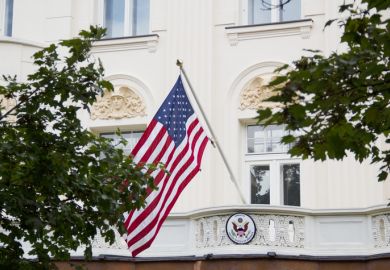Anxiety is growing about the future of research funding in Norway as a financial crackdown on the country’s main funder reverberates through the sector.
Norway’s research minister, Ola Borten Moe, shocked many by firing the entire board of the Research Council of Norway over “major financial problems” earlier this month.
Since then, the funder has announced a freeze on new grants and said that those made in June will have “lower amounts than planned”.
A briefing note prepared for the council’s replacement board proposes cutting allocations by 20 per cent in 2022 to save NKr842 million (£69.8 million) over the next two years.
Funding affected by the freeze would include the FRIPRO open call for groundbreaking research, the Norwegian Centres of Excellence and Centres of Research Based Innovation schemes, and an infrastructure programme.
“I don’t really understand what is going on,” Edvard Moser, winner of the 2014 Nobel Prize in Physiology or Medicine, told Times Higher Education. “I am scared what’s going to happen; it’s a lot of uncertainty about the future.”
Professor Moser, who is founding director of the Kavli Institute for Systems Neuroscience at the Norwegian University of Science and Technology (NTNU), said the proposed cuts were “quite substantial” and that he had “never, ever seen anything” like it.
The situation could be particularly dire because the council is the sole funder of basic research in Norway, he added, with the only alternative being equally competitive European Union funding.
“I have several colleagues that have moved to Norway to establish their new research groups, and without funding that then becomes impossible,” said Fredrik Jutfelt, who studies fish ecophysiology at NTNU.
“It’s extremely bad for Norway as a research environment, and it’s going to deter people from moving here,” he said, adding that early career researchers who must win grants for their salaries were also “very vulnerable”.
“These are people that have been trained for science for a decade or more and they might not be given a chance in academia just because of this political statement,” Professor Jutfelt said.
“It’s extremely serious on multiple levels,” said Jens Jungblut, an associate professor specialising in higher education and research policy at the University of Oslo.
“It also opens a kind of fundamental question: what is the new contract or pact between the government and the research council or between the Norwegian research landscape and the government?”
The council is in talks with Universities Norway (UHR) and the Association of Norwegian Research Institutes to find solutions. In a statement, UHR said the funding freeze “will have very negative consequences for Norwegian research for several years to come”.
It has asked parliament to boost the research council’s budget because fixing its finances “will take longer than one budget year”, adding that it was also “crucial” that the government and funder find “immediate measures” to contain the fallout.
“Everyone is shocked but now waiting to see whether the parliament will stop this or not. I don’t think anyone really believes that this will be the end result because it’s so disastrous,” said Professor Moser.
“They should be able to solve it in a way that doesn’t stop research funding and makes a lot of damage that takes years to build up again.”
Register to continue
Why register?
- Registration is free and only takes a moment
- Once registered, you can read 3 articles a month
- Sign up for our newsletter
Subscribe
Or subscribe for unlimited access to:
- Unlimited access to news, views, insights & reviews
- Digital editions
- Digital access to THE’s university and college rankings analysis
Already registered or a current subscriber?








